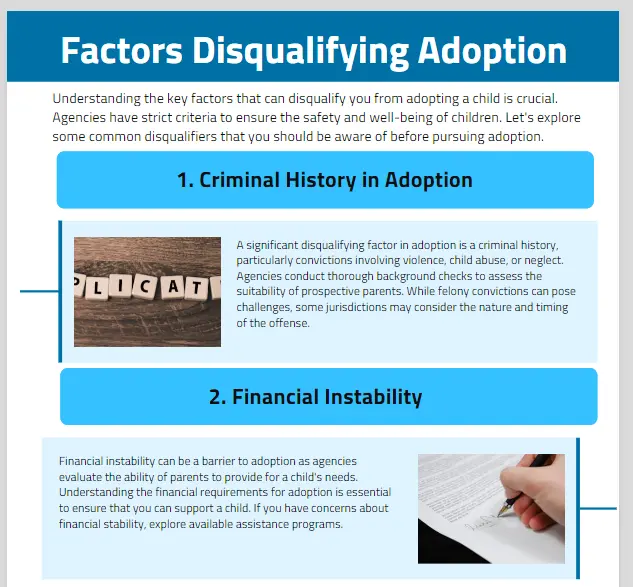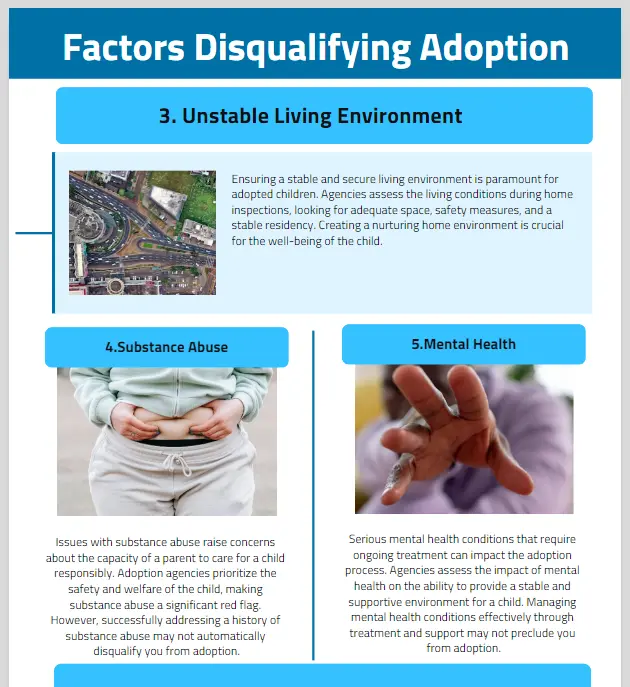What will disqualify you from adopting a child?
Are you considering adoption? Whether you’re a single individual exploring single parent adoption eligibility or a couple embarking on this journey together, understanding potential roadblocks can help you prepare for a smoother path to parenthood. This exhaustive guide explores what will disqualify you from adopting a child, eligibility, requirements, and common disqualification factors to help you navigate the adoption process successfully.
Table of Contents
Understanding the Child Adoption Screening Process
Importance of Suitability
Adoption agencies prioritize placing children in safe, loving, and stable homes. The adoption home study is a critical part of this process, evaluating your suitability for adoption. This thorough assessment ensures the well-being of the child is paramount.
Thorough Screening
Most hopeful adoptive parents undergo a rigorous screening process to determine their fitness for adoption. This includes:
1. Adoption background check
2. Detailed home study process for adoption
3. Financial assessment
4. Reference checks
5. Overall stability evaluation
Common Disqualifying Factors From Adopting A Child
1. Criminal History

Serious criminal convictions, especially those involving violence, child abuse, or neglect, can be major disqualifiers. A criminal background check for adoption is standard practice. While adoption and felonies can be challenging, some jurisdictions may consider the nature and timing of the offense.
2. Financial Instability
Financial stability is crucial to provide for a child’s needs. Agencies assess financial requirements for adoption to ensure you can support a child. If you’re wondering, “Can you adopt if you are poor?” know that various factors are considered, and financial assistance programs may be available.
3. Unstable Living Environment
A safe and secure home environment is essential for an adopted child. During the home inspection for adoption, agencies assess suitable living conditions. This includes adequate space, safety measures, and a stable living situation.
4. Substance Abuse
Active substance abuse issues raise concerns about a parent’s ability to care for a child responsibly. Addiction and adoption don’t mix well, as substance abuse can impact child custody. However, a history of substance abuse that has been successfully addressed may not necessarily disqualify you.
5. Mental Health Concerns
Serious mental health conditions requiring ongoing treatment might be a concern, depending on the severity. Agencies consider how mental health and adoption intersect, including conditions like depression. A well-managed condition with a treatment plan may not be a barrier.
6. History of Domestic Violence
A history of domestic violence raises significant safety concerns for the child. If you’re wondering, “Can you adopt with a restraining order?” it’s crucial to address this issue professionally and demonstrate significant changes in behavior.
7. Lack of Emotional Preparedness
Emotional readiness to handle the challenges and rewards of adoption is crucial. Agencies may assess your emotional preparation for adoption and might recommend joining adoption support groups to build a support network.
Related Articles For You:
Should I Adopt? Weighing the Pros and Cons of Adopting a Child?
Should I adopt a child quiz?
Use of Mental Health Records in Child Custody Proceedings.

Mitigating Factors and Exceptions That Can Disqualify You From Adopting A Child
1. Expunged Criminal Records
Expunged criminal records may not necessarily disqualify you from adoption. If you’re wondering, “Can you adopt with a misdemeanor?” The answer often depends on the nature of the offense and how long ago it occurred.
2. Addressing Past Issues
Demonstrably addressing past issues can improve your chances of adoption. This might include:
– Rehabilitation for adoption
– Following a mental health treatment plan
– Overcoming addiction
– Demonstrating financial stability
– Improving living conditions
Showing commitment to personal growth and stability can strengthen your case.
Search For Professional Guidance
Consulting an Adoption Attorney
Consulting with an adoption attorney specializing in your state’s laws is essential. An adoption lawyer consultation can provide valuable insights into your specific situation and help you navigate legal challenges.
Understanding Specific Requirements
Each state and adoption agency may have specific requirements, so legal guidance is crucial. Research adoption laws by state and adoption requirements by agency to ensure you meet all necessary criteria.
Types of Adoption to Consider
1. Domestic infant adoption
2. International adoption
3. Foster care adoption
4. Adopting older children
5. Adopting siblings
6. Single parent adoption
Related article: How to Get Full Custody of Your Child in the US?
The Adoption Process Overview
1. Initial research and education
2. Choosing an adoption professional or agency
3. Home study process
4. Matching with a child
5. Legal proceedings
6. Post-adoption support
Conclusion
Being aware of potential roadblocks and seeking professional guidance can significantly smooth your adoption journey. By preparing for adoption and building a strong adoption case, you increase your chances of success.
Related Articles For You:
How to File a Motion for Temporary Relief in Child Custody Cases?
FAQs
1. What disqualifies you most from adoption?
Serious criminal history, particularly involving violence against children or vulnerable individuals, is a major reason for disqualification.
2. Can I adopt with a criminal record?
It depends on the severity and nature of the offense. Expunged records might not be a barrier. Consulting an adoption attorney is crucial.
3. Does my financial situation automatically disqualify me from adopting?
Financial stability is important, but adoption agencies consider various factors. Explore financial assistance programs if needed.
4. What kind of living environment is considered unsuitable for adoption?
An unsafe or unstable home environment would raise concerns. The focus is on providing a secure and healthy space for the child.
5. Can I adopt if I’m struggling with addiction?
Active substance abuse is a concern. Demonstrating recovery and commitment to sobriety can improve your chances.
6. Does having a mental health condition automatically disqualify me?
Serious mental health conditions requiring ongoing treatment might be a concern. However, manageable conditions with a treatment plan might not be a barrier.
7. What if I have a history of domestic violence?
A history of domestic violence raises red flags due to safety concerns for the child. Seek professional help to address the issue.
8. Is there anything I can do to improve my chances of being approved for adoption?
Address past issues, seek professional guidance, and ensure emotional preparedness. Research your state’s adoption laws and specific agency requirements.
Taking the Next Step
If you’re ready to move forward, consider researching “adoption agencies near me” or learning “how to find an adoption professional” to begin your journey. Remember, while there may be challenges, many individuals with complex backgrounds successfully adopt and provide loving homes to children in need.
By thoroughly preparing, addressing potential issues, and seeking support, you can navigate the adoption process more confidently. Every adoption story is unique, and with perseverance and the right resources, you can overcome obstacles to build your family through adoption.
About the Author

Sarah Klein, JD, is a former family law attorney with over a decade of courtroom and mediation experience. She has represented clients in divorce, custody cases, adoption, Alimony, and domestic violence cases across multiple U.S. jurisdictions.
At All About Lawyer, Sarah now uses her deep legal background to create easy-to-understand guides that help families navigate the legal system with clarity and confidence.
Every article is based on her real-world legal experience and reviewed to reflect current laws.
Read more about Sarah
